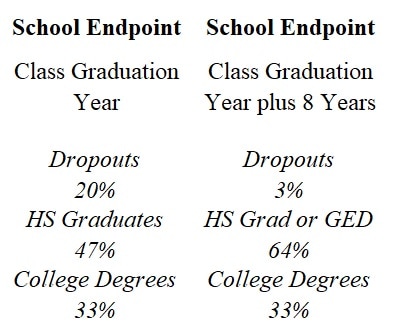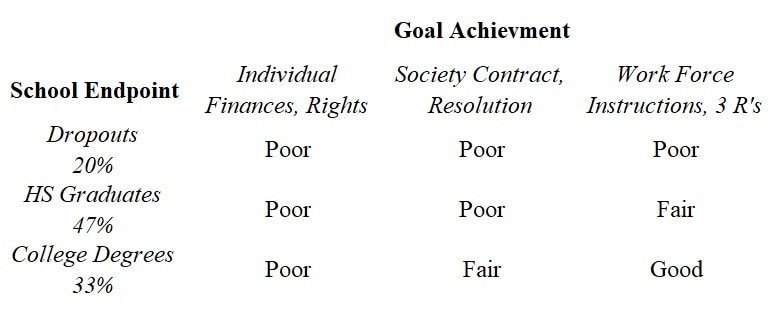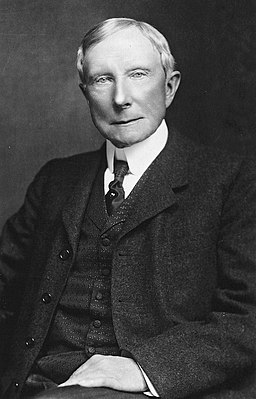Handful of High School Curriculum Changes
As discussed in Education Goals, the three goals of schooling for students are:
- Develop their capabilities as completely as possible
- Teach the rights and responsibilities of adulthood and citizenship
- Develop skills sufficient for their next stage, whether it’s immediate entry into the work force or further education in preparation for their employment
Core Changes
Schooling changes are needed to accomplish all three goals. The basic adjustment is a shift toward personal development and citizenship. The three goals are mandatory for the entire student body. Also, we must ensure that dropouts are presented with more life and work skills before they drop out.
- Individual Development
- Financial skills and budget management for adult life. Not optional, but mandatory.
- Practice expressing one’s opinions as well as listening and comprehending disagreement.
- Appreciation of advancements in medicine, material goods creation, and environment.
- Relation between their prospective employment and lifestyle.
- Individual and Society
- Citizenry course. Social contract. The roles, rights, and responsibilities of individuals, social groups, and governments.
- Conflict resolution, including role playing. Not Julius Caesar and Brutus in a Roman forum, but Beth and Sammy at the food court or Justin and Deandre on the playground.
- Reasoning. Learning the differences between facts, opinions, and theories on current issues.
- Individual and Work Force
- Reading and following instructions.
- Study of prospective work content.
- Income range for intended occupation. Consumption patterns for that income.
High school curricula have diverse forces acting on them. What are the minimum alterations to the curriculum that would satisfy K-12 core goals? Focus more course work on improving personal skills, a person’s role in the society, and providing work skills appropriate for jobs available to graduates.
Current School Evaluation
Figure 1. Goal Achievement
The three major types of student and three school goals yield nine results in Figure 1. Only one is good and two are fair. See high school success for more on schooling, jobs, income, and employment.
Dropouts fare poorly. They leave high school with their potential unfulfilled. Society experiences a high crime rate among dropouts. We are not served well by them. Also, dropouts find it hard to find satisfactory jobs in the work force, resulting in a higher unemployment rate.
Overall, high school graduates get only a poor chance to develop their potential—intellectual, creative, athletic, and social. They understand some basics of the social contract, but the society’s obligation is given short shrift. Many non college-bound students learn skills sufficient to gain employment leading to a satisfactory lifestyle, but a considerable number never realize their expectations in the workplace and home. They did not get a chance to develop their individual skills as much as they would like. Conflict resolution, essential in a competitive society, is not well covered. Also, many employers complain that significant numbers of high school graduates bring a sketchy grasp of fundamentals (such as reading, writing, arithmetic, and following instructions) to the workplace.
College-bound graduates, although prepared academically for further schooling, can easily develop burdensome student debt. Often, the cost of their educational choice does not result in the salary they need to support the lifestyle they want. These students need a better preparation in high school to grapple with these issues realistically.
In the real world beyond school, highly successful individuals can come to believe their success is wholly due to their effort. They overlook the support society gives them, as well as the contributions of other employees who magnify their efforts. That mistaken hubris has caused much pain to society. It should be addressed in high school, when the link between individual and society needs to be taught. That mistaken hubris has caused much pain to society. It should be addressed in high school, when the link between individual and society needs to be taught.
Every student, at a minimum, must be given an introductory survey of science, replacing the requirement for a specific subject. The course would start with the technological progress that has been made and the scientific method. In the overviews of the major branches of science, it reveals the fact-based methodology of science. The goal is appreciation of progress, not mastery of minutiae. Specifically the course should be required before the junior year, so that drop out students are exposed to the material.
More Curriculum Changes
For those students who will not finish high school with their peers, replacement of academic course with those that develop practical skills they can use immediately has a better chance of sticking.
For those high school students whose goal is a diploma to start in the work force, substituting work preparation courses for academic preparation would benefit the student, society, and the work force.
A high school diploma would indicate completion of its three goals. College-bound preparation would be a separate certification. This splitting allows a separate grading scheme for three goals courses—fail, basic rule, with one condition, and all aspects of rule. This grading would control the high school diploma. The separate college-bound certification would be determined as currently with numeric or alphabetic grades.
In this post, students are expressing their desired occupation, career path, or educational goal. The school and counselors are providing relevant scholastic requirements, expected salaries, and how the student’s performance melds with those desires. It is not the school’s role to slot the students into an occupational slot, but to warn them when they are off-course, help them achieve, and assist them in making adjustments.
Individual
Once the school is sure potential dropouts are covered, students under sixteen must declare (with parental approval) an educational path—occupational or college-bound. Some occupations might lend themselves to substituting specialized work-related courses, discussions, or experiences in place of an academic course. Some occupations might lend themselves to substituting specialized work-related courses, discussions, or experiences in place of an academic course.
A course on critical thinking, based on current issues, must be required. Issues the students raise can be used effectively to teach methods of straightforward reasoning. Straightforward reason implies an immediate rule of an event that causes a result. It does not concern itself with exceptions to the rule, except to mention they exist.
A second science course should be offered to those not intending a college path. This course would be in the technology of their intended employment. Surely professional educators can make better substitutions, but perhaps instead of an academic biology requirement for prospective restaurant workers, a laboratory course with food preparation, safety, and cleanliness is more practical.
Society
All high school students should be required to take a financial literacy course by the time they are sixteen. For most students this requirement will be no burden. For those who might drop out or choose a future without a bachelor’s degree, financial literacy could substitute for advanced algebra without harm to the student’s prospects. Instruction in budgeting would tie incomes and expenses to prospective jobs and lifestyles.
Similarly, an opportunity to take an English course focused on reading instructions and documenting procedures used in jobs available to high school graduates must be offered. This substitution for an English literature unit should be allowed early, so that potential dropouts could take it.
Instead of a second course on American history, exposure to the American social contract with the rights and responsibilities of citizens, society, and government must be mandatory.
Work Force
As mentioned earlier, an introductory exposure to the progress of science and lifestyle would teach future employees to appreciate the relationship between occupations and society.
Learning how to follow instructions not only benefits the individual, but it also increases the work force’s productivity. The ability to improve a procedure and write one of your own is a valuable skill in any occupation, and often an aid to advancement.
Ten Years After

Figure 2. Comparing education eight years after graduation class year
A remarkable 85% of high school dropouts either returned to high school to earn their diplomas or passed the GED (general education development) test. Whatever their reasons for dropping out, they learned that mastering high school skills had value in their lifes. So let’s give them more useful skills for their gap years.
Of the 64% with high school diplomas or GEDs, 19% earned job certification or community college degrees. Many others took miscellaneous college courses in exploring how to reach their goals.
Although further information on those who went on to college degrees is available (see link below), that was not germane to this post.
In short, all students should be better exposed to course material that fits into a chosen life path. Currently many graduation requirements are overly academic and not well suited to those entering occupations immediately after high school. Replace a few academic requirements with pragmatic courses that develop personal relation skills, an appreciation of one’s rights and responsibilities, and useful instruction competence. The college-bound students retain their right to take additional academic courses.
Additional Information
Education Goals
Creativity and Academics
High School and Success
Social Contract
School Choice in the United States. Published 2019. External web site




1 thought on “Handful of High School Curriculum Changes”